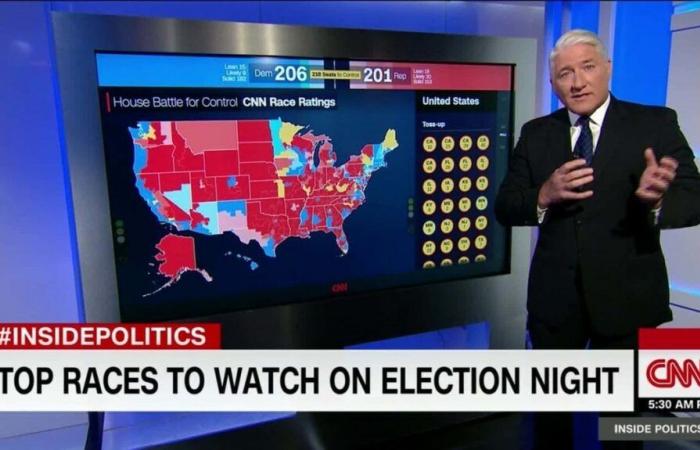
On Tuesday, November 5th, the big election of fate is coming up in the USA. Due to the time difference, little will happen for us in Switzerland on this day. The first important results will arrive on Wednesday night – but the end is unknown.
If you would like to follow all the events live, we will present the best options for this – as well as all the programming during election night and when the first results can be expected from which states.
Where can I watch the US elections live?
Online: watson
On watson you will find a live ticker with all important developments and all results live on election night and beyond. Reporting runs around the clock, and we will most likely have a CNN live ticker embedded (see below.)
Im TV: SRF
Our public television offers those interested various options to follow the elections live.
- “10 to 10”: Moderator Arthur Honegger will host the show live from Washington.
- Afterwards: Moderator Barbara Lüthi discusses current events surrounding the elections with guests in the “Club” special program.
- During the night: Between midnight and 6 a.m. SRF takes over the live broadcast of an American TV station, according to SRG.
- From 6 a.m.: Urs Gredig discusses the night’s events in a special broadcast on SRF 1. Together with the guests Sebastian Ramspeck (“#SRFglobal” presenter and international correspondent SRF), Reto Lipp (presenter “ECO Talk”), Nicoletta Cimmino (head of publishing at Gassmann Media) and Rahul Sahgal (CEO of the Swiss-American Chamber of Commerce) he classifies the events of the night, according to the SRG.
- Between 9 a.m. and 11 a.m.: hourly updates.
On YouTube: CNN and Co.
Presenter John King with his well-known Magic Wall on CNN.Image: CNN
Most US TV channels cover the elections around November 5th day and night. However, not all of them are accessible abroad and/or for free. At least CNN does: If you don’t have the channel at home, you can access the live stream via YouTube. According to CNN, it runs from Tuesday at 12 p.m. (Swiss time).
ABC News can also be streamed live on their website – even from Switzerland.
How are the US elections going?
The majority of voters go to the polls throughout the day on Tuesday. However, many people have already cast their vote by postal vote or early voting. This year that’s about a third of all voters.
Polling station hours vary from state to state. Basically, they all open between 6 and 7 a.m. (US time) and usually close at 7 p.m. Then the counting takes place. The different time zones in the USA mean that ballots on the East Coast can already be counted while voters in states like Alaska and Hawaii are still on the way to the polling stations.
When will we know who the president is?
This is impossible to predict. Normally you find out the winner of the presidential election on Wednesday night. But in 2020 everything took longer than expected and Joe Biden was only really determined as the winner a few days later. It is quite possible that there will be delays again this year.
When will we find out the first results?
As soon as the polls have closed in a state, it can be “called” by US news channels for either Kamala Harris or Donald Trump. But that only happens when the broadcasters are really sure that the person will win the state.
In states that traditionally vote Republican (like Wyoming and Oklahoma) or Democratic (California and New York), this will likely happen almost immediately after the polls close – before a single vote has been officially counted.
As an example: In New York, the polls close at 9 p.m. This means that in Switzerland we should expect a result from the east coast country from 3 a.m. onwards.
In the so-called swing states such as Arizona, Georgia or Pennsylvania, where an extremely close race is expected, the broadcasters will wait until most of the votes have actually been counted and reported before making a final forecast.
It may therefore be that some states will only be declared for Harris or Trump after hours or even days. In the last election, for example, Pennsylvania was the state that ultimately gave Joe Biden enough votes to guarantee him the presidency. However, Pennsylvania was only named for Biden by most US broadcasters on the Saturday after the election – after a waiting period of four days.
The election night program – hour by hour
So the only times you can predict with certainty are the times when individual states close their polling stations.
So here are all the times, by state and in Swiss time:
1 o’clock
Polls are closing in three traditionally Republican-voting states: Indiana (with 11 voters), Kentucky (8) and South Carolina (9). At the same time, Kamala Harris is likely to have a say in the votes Vermont (3) and Virginia (13) look forward.
The polls also close in the first swing state: Georgia (16).
In Maine There is no winner-take-all principle for the four electoral votes, but two votes are awarded to the winner in each of the two congressional districts and two to the winner of the national popular vote.
1.30am
West Virginia (4 votes), a safe Republican state, will probably quickly be declared for Trump. Ohio (17) used to be a swing state (Barack Obama won here very narrowly in 2008 and 2012), but has developed towards safe Republican territory since 2016 and should be declared for Donald Trump relatively quickly.
North Carolina (16), on the other hand, has become a swing state in this election, where, according to polls, both candidates have a chance of winning.
2 o’clock
At two o’clock Swiss time, the polls close in a dozen US states.
Kamala Harris is expected to win the following states: Connecticut (7), Delaware (3), Illinois (19), Maryland (10), Massachusetts (11), New Hampshire (4), New Jersey (14) and Rhode Island (4) as well as the District of Columbia (3).
The following states will most likely go to Trump: Alabama (9), Florida (30), Mississippi (6), Missouri (10), Oklahoma (7) and Tennessee (11).
Also in Pennsylvania (19 votes), another swing state, the polling stations will be closed. The result will probably only be known after some time. The state was firmly in Democratic hands until Trump’s narrow victory in 2016, before Biden took it back in 2020.
2.30am
The polling stations in Arkansas (6) close – the six votes will most likely go to Donald Trump.
3 o’clock
A number of other clearly colored states will give both candidates a large number of votes: Kansas (6), Iowa (6), Louisiana (8), North Dakota (3), South Dakota (3), Texas (40) and Wyoming (3) are all likely to be decided in favor of Trump quite quickly.
Harris will probably Colorado (10), Minnesota (10), New Mexico (5) and New York (28) win.
Counting is now also underway in three swing states: Arizona (11), Michigan (15) and Wisconsin (10), which – if the result is close – could take days to decide. Biden won all three of these states in 2020, while Trump won all three states in 2016.
Nebraska Like Maine, it does not have a winner-take-all principle and instead splits its electoral votes – in this case three votes for the winner in each of the three congressional districts and two for the winner of the statewide popular vote.
4 o’clock
The polls close in safe Republican states Montana (4) and Utah (6). The same applies to the last of the swing states, Nevada (6).
Nevada has been repeatedly won by Democrats in recent decades, but opinion polls suggest the outcome this year is on a knife’s edge.
5 o’clock
Harris’ account should get a boost when polls close in three very safe Democratic states: California (54 votes), Oregon (8) and Washington (12). Idaho (4) will most likely be decided in favor of Mr. Trump.
6 o’clock
The urns close in Hawaii (4), a secure democratic state.
7 a.m
Alaska (3) is the last state in which voting has been completed; its three electoral votes should go to Trump.
However, it is very likely that the overall winner of the election has not yet been determined, as the counting of all ballot papers in all swing states will still take some time. If there is a landslide victory for Harris or Trump, some news networks may be tempted to declare a winner now.
However, if the election turns out to be close, we must be prepared for the fact that it will take days, if not weeks, until the next president is chosen. (lak)





